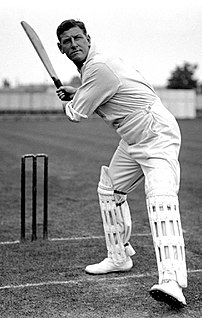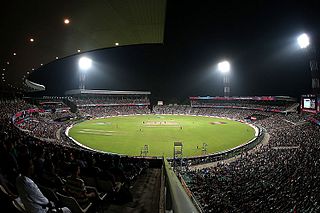
Edward William Bastard was an English first-class cricketer who played for Oxford University and Somerset. Bastard was a slow left-arm orthodox bowler, described in his Wisden obituary as Somerset's best bowler during his time with the club. Bastard was also part of the Oxford team often said to be the university's best ever.

Samuel Moses James Woods was an Australian sportsman who represented both Australia and England at Test cricket, and appeared thirteen times for England at rugby union, including five times as captain. He also played at county level in England at both soccer and hockey. At cricket—his primary sport—he played over four hundred first-class matches in a twenty-four-year career. The majority of these matches were for his county side, Somerset, whom he captained from 1894 to 1906. A. A. Thomson described him thus: "Sammy ... radiated such elemental force in hard hitting, fast bowling and electrical fielding that he might have been the forerunner of Sir Learie Constantine."

Herbert Tremenheere "Herbie" Hewett was an English amateur first-class cricketer who played for Somerset, captaining the county from 1889 to 1893, as well as Oxford University and the Marylebone Cricket Club. A battling left-handed opening batsman, Hewett could post a large score in a short time against even the best bowlers. Capable of hitting the ball powerfully, he combined an excellent eye with an unorthodox style to be regarded at his peak as one of England's finest batsmen.
William Law was an English amateur first-class cricketer, who played four matches for Yorkshire County Cricket Club between 1871 and 1873. He also played first-class cricket for Oxford University (1871–1874), Marylebone Cricket Club (MCC) (1873–1882), Gentlemen of England (1871–1883), The Gentlemen (1873) and I Zingari (1881–1882). He played non first-class games for I Zingari (1872–1875), MCC (1874) and Harrow Wanderers (1887).

Arthur Temple Lyttelton was an Anglican Bishop from the Lyttelton family. After studying at Eton College and Cambridge University, he was ordained as a priest in 1877, and was a curate at St Mary's in Reading. He later served as vicar in Eccles, before being appointed as the third Suffragan Bishop of Southampton. He gave and published a number of lectures relating to his faith, and was the Hulsean Lecturer in 1891. He was also one of eleven members of the Lyttelton family to play first-class cricket.
Stephen Cox Newton was an English cricketer who represented, and captained, Somerset County Cricket Club in the late 19th century. During a 14-year first-class cricket career, he also represented Cambridge University, Middlesex and the Marylebone Cricket Club (MCC).
The Hon. Captain Herbert Tongue Allsopp was an English first-class cricketer who played for Cambridge University.
George Philip Cecil Arthur Stanhope, 7th Earl of Chesterfield, styled Lord Stanhope until 1866, was a British soldier, and Conservative politician who sat in the House of Commons from 1860 until 1866 when he inherited his peerage and sat in the House of Lords. He was a cricketer who played first-class cricket for Nottinghamshire and was the first president of Derbyshire County Cricket Club.
George William Spencer Lyttelton CB FRGS was an English civil servant from the Lyttelton family who acted as private secretary to William Ewart Gladstone during three of his terms as Prime Minister of the United Kingdom. He was also one of eleven members of the Lyttelton family to play first-class cricket; primarily for Cambridge University during his time studying there.
Alfred Henry Evans was an English first-class cricketer. He was a right-handed batsman who bowled right-arm fast-medium.
George Henry Longman was an English first-class cricketer. Longman was a right-handed batsman who played occasionally as a wicketkeeper.
Henry Arkwright was an English amateur first-class cricketer. He made seventeen appearances between 1858 and 1866. He is one of only three cricketers to have taken 18 first-class wickets in a match.
Frederic Tristram Welman (1849–1931) was an English amateur cricketer who played 65 first-class matches for the Marylebone Cricket Club, Somerset and Middlesex. He was a wicket-keeper who also played as a lower-order batsman. He did not pass 50 runs in any first-class innings during his career.

Robert Henry Lyttelton was an English cricketer who appeared in seven first-class matches between 1873 and 1880. A member of the Lyttelton family who were prominent in English cricket in the mid to late 1800s, he did not play county cricket, but appeared for a number of representative sides, in which players were often chosen more for their social status than their cricketing ability. In his later years he was known for his views about sportsmanship in cricket, and he successfully campaigned for changes in the laws of the game to penalise blocking the wicket with the legs. He published two books about cricket and collaborated with others on two more.
Francis Baker was an English cricketer. A left-handed batsman born in Cirencester, Gloucestershire, Baker's career in first-class cricket spanned eight matches for the Marylebone Cricket Club, Gloucestershire County Cricket Club, and two Gentlemen's teams between 1866 and 1875. He scored 199 runs in these matches, with a batting average of 15.30. His best innings, a score of 53, came against Surrey on 4 June 1868, while playing for the MCC. In other cricket, he played over two-dozen matches for Cheltenham College – his alma mater – and the Free Foresters Cricket Club.
John Morley Lee was an English clergyman and cricketer who played in first-class cricket matches for Cambridge University, Surrey, Marylebone Cricket Club (MCC) and various other amateur teams in the late 1840s. He was born at Chelsea, London and died at Botley, Hampshire.
The Reverend Walter Baptist Money was an English clergyman and cricketer who played first-class cricket for Cambridge University, Kent, Surrey, the Gentlemen and several other amateur sides between 1867 and 1871. He was born at Sternfield, Suffolk and died at Edgbaston, Birmingham.
Charles Henry Parnther was an English civil servant and cricketer who played first-class cricket for Cambridge University, Marylebone Cricket Club, the Gentlemen and All-England teams between 1832 and 1836. He was born at Westminster, London and died at Walham Green, also in London.
Alfred Lubbock was an English amateur cricketer who played first-class cricket for a variety of side including Kent County Cricket Club and the Marylebone Cricket Club between 1863 and 1875. He was considered to be one of the best batsman of his era, comparable to WG Grace, and also played association football, playing for Old Etonians in the 1875 FA Cup Final.






